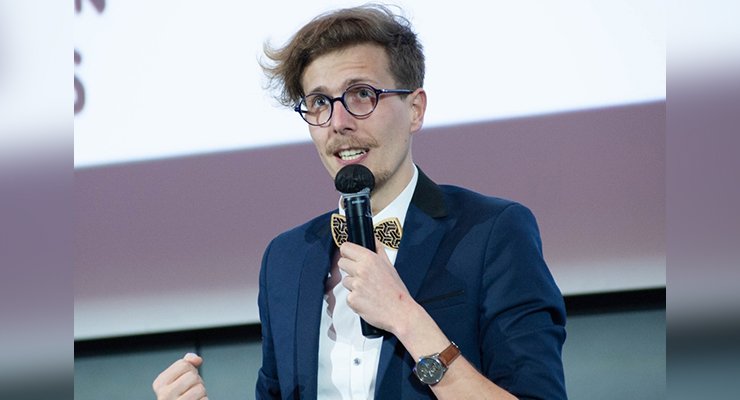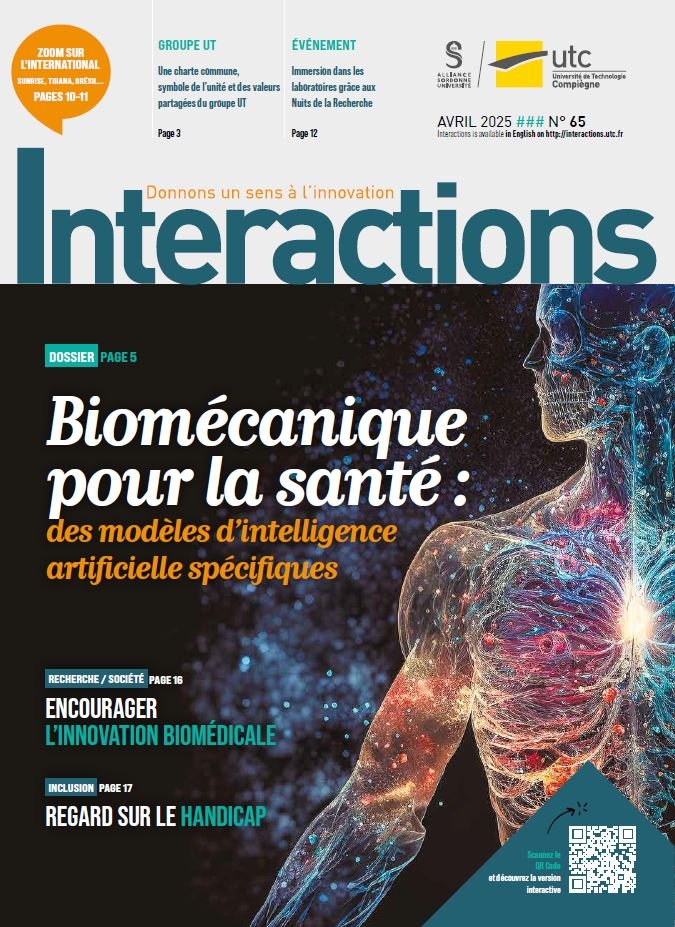From BMBI to the stage of “Ma thèse en 180 secondes”

Nicolas Rivoallan, a doctoral student at UTC-Compiegne and under coPhD supervision with Leibniz Universität of Hanover, in biomechanics and bioengineering, was unanimously acclaimed by the jury during the Sorbonne University final of the «My thesis in 180 seconds» contest, last March. His challenging topic: «Repairing your broken tendon, using a material to reconstruct a bioartificial bone/tension/muscle».
After obtaining a scientific BAC in SVT (life sciences…) with a maths speciality option and a European maths-English section, Nicolas Rivoallan entered a IUT in Mechanical and Production Engineering. To get a little closer to the field of life, he entered the ENSMM in Besançon in the «Microtechniques and Health» speciality.
He did his three years of engineering school through an apprenticeship at ADHEX Technologies near Dijon. «This company specialises in adhesive products for the automotive, industrial and health sectors, but it was also a very good school for me to learn the engineering profession in very different sectors. Once I got my engineering degree, I looked for a thesis subject, and that’s where I discovered the research activities of UTC, in particular the Biomechanics and Bioengineering Laboratory (BMBI). Unfortunately, my profile lacked a bit of «bio» aspect to answer the research challenges of the laboratory. This is how Cécile Legallais advised me to join the Master 2 Biomechanics and Bioengineering of the UTC,’ he explains.
His objective has always been around teaching in higher education, which is why he wanted to enter a thesis to reach positions such as lecturer. «I have the opportunity to see the profession of lecturer-research scientist through the supervision of practical work at UTC and my research activities in the laboratory. Today, the world of scientific mediation and popularisation also interests me a lot, always with the pleasure of sharing knowledge. My thesis in 180 seconds or the science festival are events that challenge me in scientific popularisation”.
A thesis in 180 seconds
«My thesis aims to reconstruct the junction between bone, tendon and muscle using tissue engineering. The idea is to create a material composed of biocompatible polymeric nanoscopic threads, and then to deposit cells that will attach themselves to these threads and grow into bone, tendon or muscle depending on how the threads are arranged. Indeed, by assembling the threads in a honeycomb shape (hexagons), we encourage differentiation of cells into bone,» explains Nicolas Rivoallan, for whom the «My thesis in 180 seconds» adventure began in January 2022 with a training course on public speaking organised by Sorbonne University and relayed by the doctoral school.
It was following this day that the criteria for the pre-selection were given: 90 seconds only to speak about your subject and interest the jury via zoom. The results were given the same evening and only sixteen candidates were retained out of the forty or so who had registered. «This is where the great adventure began! We again had more specific training for the competition until the big day. It was certainly a stressful evening for all of us, but it was also a joy to see us in person after the regular zoom training sessions I had organised while I was still in Germany, in my other thesis laboratory,» he recalls. Following our performances and the jury’s deliberation, I was awarded first prize by the jury and thus selected for the national semi-final. »
POPULARISING SCIENCE : WHAT A CHALLENGE!
Each year in October, the “Fête de la Science” takes place throughout France. It is an opportunity for laboratories to present their activities to the public at large. This year, during the CNRS festival, the UTC-BMBI laboratory was invited to hold a stand at the media library of the city of Cambrai, in addition to Compiègne at UTC.
«Pascale Vigneron, Jean-François Grosset and myself had the pleasure of presenting the laboratory’s activities to classes of secondary school students as well as to the general public. It was also an opportunity to meet other laboratories in Hautsde- France as well as the team in charge of this event and of the scientific mediation activities of the CNRS in a more global way,’ says Nicolas Rivoallan, who also held a stand at UTC with Cécile Legallais, director of the laboratory, on the subject of artificial organs such as the liver or the bioartificial tendon, flagship projects of one of the teams of the BMBI laboratory.
From September 6 to 10, the 48th congress of the European Society for Artificial Organs (ESAO) was held in Krems, Austria. The UTC-BMBI laboratory is actively participating in this congress as it brings together many researchers working on technologies and applications close to its research work.
«This was my first scientific conference, and not the least. During the «my research for dummies» session, I had the opportunity to present my thesis again in 3 minutes and to be awarded the first prize”. The BMBI laboratory was able to shine with its two presentations on artificial liver and tissue engineering of the bone/mother junction, led respectively by Cécile Legallais and Nathália Oderich Muniz, a post-doctoral fellow in the team.




